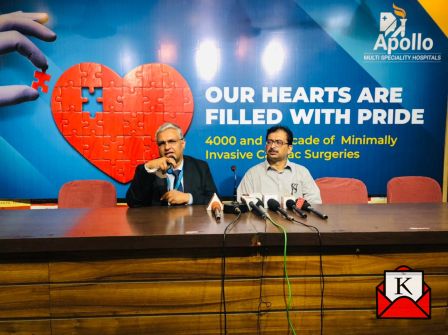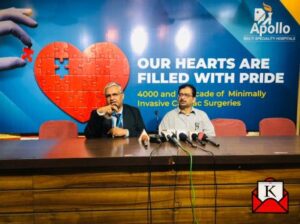Apollo Multispecialty Hospitals, Kolkata Completed 4000 MICS Surgeries


Over 4000 Minimally Invasive Cardiac Surgeries (MICS) have been successfully completed at Apollo Multispecialty Hospitals in Kolkata. MICS is a novel approach to heart surgery that has a number of advantages. MICS is less painful and almost scar-free because it uses a 1.5 to 3-inch incision rather than the 8 to 10-inch incision used in traditional open-heart surgery. It also entails a quicker recovery, with a shorter hospital stay after surgery and a quicker return to normal life.
Traditional open surgery was previously the only option for CABG (Coronary Artery Bypass Grafting), valve repair or replacement, and heart hole closures, among other procedures. MICS is now used in procedures such as minimally invasive bypass surgery (MICS CABG), endoscopic vein and radial artery harvesting, MICS aortic valve, minimally invasive mitral valve surgery, keyhole ASD closure, and coronary bypass, thanks to advances in medical science.
Specialized surgical instruments are used in this Keyhole Heart Surgery. In India, heart attacks account for 14.5 percent of all deaths, and MICS CABG, or keyhole bypass, has emerged as a treatment option for patients with coronary artery disease. This approach eliminates any concerns about being able to complete surgeries safely. If MICS becomes standard practice everywhere, people will prefer MICS bypass to angioplasty, and the 14.5 percent figure will drop dramatically.
MICS can perform 95 percent of all cardiac surgeries, including bypass, valve replacement, heart hole closure, cardiac tumor removal, pacemaker implantation, and others. It is even safe for very elderly patients over the age of 80-90 who have other serious health problems.
Advantages of MICS over the conventional open-heart surgery:
- No bones are cut; blood loss is almost negligible, eliminating the need for blood transfusions, which can lead to blood-borne infections; and all infections related to wounds or post-operative lung infections are reduced. This makes the surgery ideal for diabetics and patients with low infection resistance.
- The incision is very small, measuring only 2-3 inches, making it difficult to tell that heart surgery has been performed. This also lowers the risk of scarring.
- In this case, the hospital stay and recovery time are minimal, and under normal circumstances, the patient recovers within 7 days of surgery.
- Future surgeries will have significantly lower risk factors.
